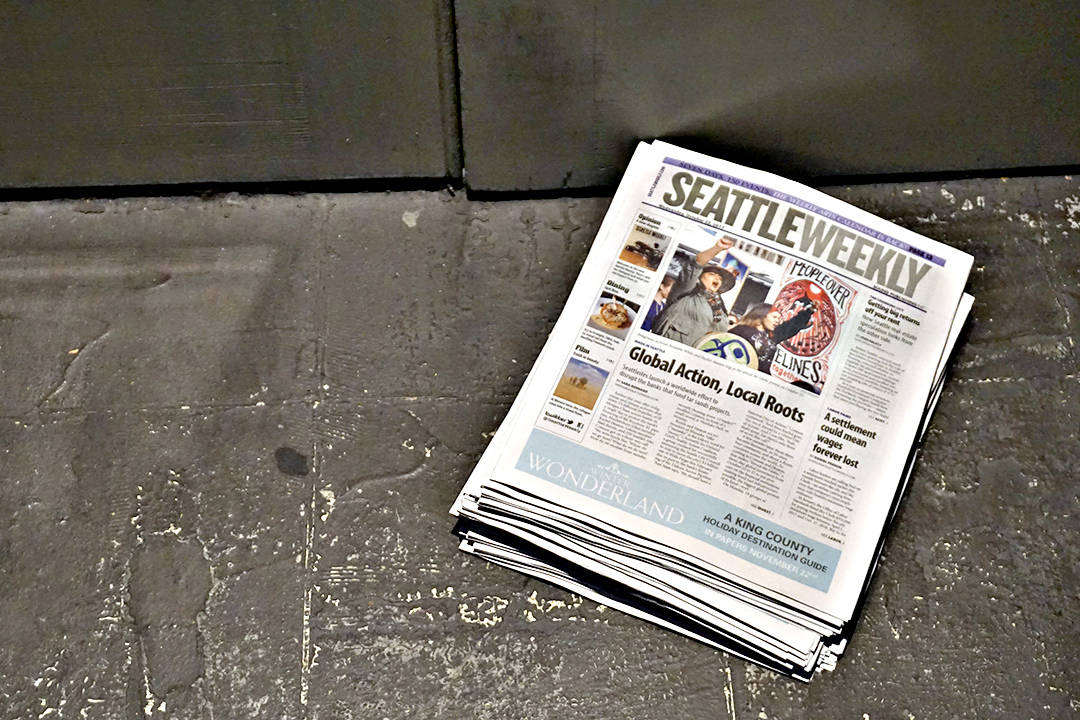When “Arrows,” the first single from the second Fences album, Lesser Oceans, was released last August, it started in familiar territory for Christopher Mansfield, the sometimes-Seattle songwriter who has written tortured indie folk under the moniker for the better part of the past decade.
“My old man, he kicked me out, kicked me out, when I told him that I live this way,” Mansfield sings, revisiting the terrain of one of his oldest, most powerful songs, “Same Tattoos,” a heartbreaking ode to paternal absence found on Fences’ self-titled 2010 debut. “It’s not like you were really gone . . . but you were and I never felt love,” a younger Mansfield sang then.
But before Mansfield has a chance to delve again into parental neglect, the song is hijacked by Macklemore. The rapper is credited as a featured artist on this single, but it’s a clear takeover, the Seattle MC devoting more than half the song to verse exploring the misery that accompanies his massive fame. Speaking of his plight in a reflective third person, Macklemore shares that “when the world finally sees his art, he wishes he’d never made it” over ornate production from Ryan Lewis. Mansfield’s personal drama gives way to Macklemore’s public one, and we never hear of Mansfield’s old man again.
Mansfield and Macklemore have a history, woven with a common struggle with substance abuse and made manifest in the 2010 Macklemore and Ryan Lewis single, “Otherside (Remix),” for which Mansfield wrote and performed a foreboding hook.
With “Arrows,” Macklemore and Lewis are returning the favor—and that favor has yielded results, garnering more than 4 million YouTube views for the song’s video and landing Mansfield on Good Morning America and Ellen.
Fittingly, Lesser Oceans sounds like a play for a bigger stage. The album is Fences’ first for Atlantic Records imprint Elektra, and it sounds like a major-label makeover. In addition to the Macklemore appearance—a huge score in contemporary pop music—there’s an entirely new band behind Mansfield, and the album features glossy synth lines, more electric guitars, and intricate production work from Jacquire King (Kings of Leon, Of Monsters and Men, Modest Mouse).
In some ways, Fences seemed ripe for such a recast. The debut album was a dark rumination filled with regret and loneliness, consisting of little more than Mansfield’s croon, acoustic guitar, some piano, and a brushed drum, along with the odd female vocal here, a little bit of synthesizer there. It was a tremendously beautiful album, dark and fragile, angry yet tender. The music press took notice, Spin in particular recognizing Fences as one of 2010’s 10 best. (Full disclosure: I was paid to write the promotional biography for that release.)
Within that album, though, were the seeds of a more grandiose pop sound. Mansfield, a former student at the Berklee College of Music, invests his songs with bright earworm melodies strong enough to keep tracks about loneliness, regret, and death buoyant—a hallmark of great pop songcraft. Those melodies remain throughout Lesser Oceans, though here they’re delivered not with simple guitar and piano, but within intricate synthesizer lines that sparkle and swell as each song jogs along.
Lyrically, Mansfield is prone to repeat his most searing lines over and over. In the intimacy of the lonely shoebox ballads found on his earlier releases, this practice comes across as meditative, or perhaps compulsive. On Oceans, though, with an expansive sound befitting the arena, they become anthemic. And as a blueprint for a live experience, it works. “I think that death is comin’ around, I like it, I like it,” Mansfield sings on “Songs About Angels,” and you can imagine his fans gleefully singing along.
The strongest moments on the album, however, are the simplest—as on “My Mountain Is Cold,” a tender, devastating mandolin-fueled duet that finds Mansfield trading lines with vocalist/bassist Lindsey Starr, recalling Evan Dando and Juliana Hatfield in the Lemonheads.
But as with “Arrows,” the outside influences meant to lift Mansfield’s art sometimes crowd out his greatest asset, that lone voice singing heartbreaking songs. Maybe its a necessary trade-off to reach a wider audience. If so, it’s an unfair one.
“Running Off the Gods,” which follows “Arrows” on Oceans, is a reminder of what has been lost; for fans of Fences’ prior work, it should stand as a favorite. “People all around me are telling me I’m so damn lucky,” he sings, perhaps about his own burgeoning fame, as he plucks out a rolling guitar line. “In getting what I wanted, I became so goddamn ugly.”
mbaumgarten@seattleweekly.com








